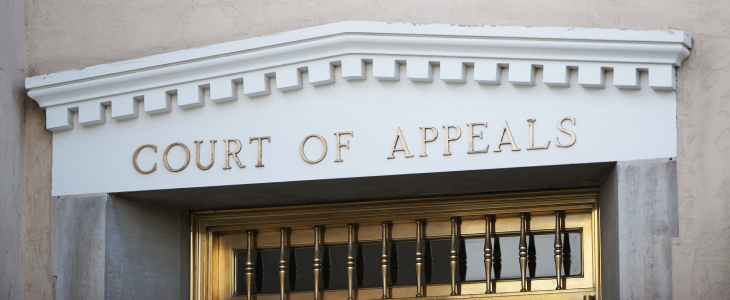In the nuanced and complex landscape of federal litigation, understanding the grounds upon which you can pursue an appeal is critical. Whether it’s a civil or criminal case, finding a legitimate basis for appeal is critical so an appellate court can take a second look at your case. Appellate courts can’t re-try your case like a trial court, and the grounds for appeal are exceptionally limited. That’s why you need an experienced appellate attorney who can conduct a rigorous examination of your case to find any issue that could warrant an appeal. At The Keleher Appellate Law Group, we specialize in post-trial and appellate advocacy, leveraging our knowledge, experience, and expertise to deliver strategic and relentless representation. Grounds for appeals in federal court include, but are not limited to:
1. Legal Errors, Misinterpretation, or Misapplication
The core purpose of appellate advocacy is to right legal wrongs. If a trial court judge made a legal error, misinterpreted the law, or misapplied the law, you have an absolute right to hold them accountable for their errors and to see justice prevail. Appellate courts meticulously review trial court cases to ensure the trial court judge followed, applied, and interpreted the law correctly. Common errors include issues with jury instructions, misapplied legal standards, or improper exclusion or inclusion of evidence at trial. An appellate attorney can scrutinize your trial records to identify any legal errors that may have impacted the overall outcome of your case, a core foundation for appellate relief.
2. Abuse of Discretion
Trial court judges are granted a lot of power and leeway, but it has to be used properly. If a trial court judge abused their discretion, such as making rulings or decisions that were unfounded, unreasonable, arbitrary, or capricious, you have strong grounds for appeal. The appellate court will assess whether the trial court acted reasonably and consistently with standard practice and established legal principles. An experienced appellate attorney can conduct a thorough review of the trial judge’s decisions, ensuring they have an adequate basis when ruling on motions, trial conduct, and sentencing.
3. Constitutional Violations
Appeals in federal court often hinge on claims that the trial court violated a party’s constitutional rights, including the right to a speedy and fair trial, due process violations, infringements on freedom of speech or religion, violations of the confrontation clause, and unlawful searches and seizures. Effective appellate advocacy requires a thorough examination of the case record, scrutinizing and acting upon any violations of a party’s constitutional rights.
4. Factual Errors or Insufficient Evidence
Parties may have grounds for a federal court appeal if the trial court’s findings of fact weren’t supported by adequate evidence or were clearly erroneous. Federal appellate courts will review the trial record to ensure that there is an adequate evidentiary basis for the trial court’s findings and factual determinations. If the evidence presented at trial was insufficient to support the trial court judge’s rendered judgment or there were errors in factual determinations, an appellate court can overturn the decision and remand the case back to the trial court for further proceedings.
5. Procedural Irregularities
Trial courts must follow proper procedure closely, and any irregularities or errors of procedure can be a compelling ground for appeal. Whether it was a violation of procedural rules or a failure to follow standard procedural practice, an appellate court can take action to rectify procedural errors. An experienced appellate attorney with a comprehensive knowledge of legal procedure can ensure that every party was afforded proper procedure in accordance with the law, and bring forth appeals if there were any procedural errors or irregularities.
6. Sentencing Errors
Criminal appeals frequently focus on sentencing issues, challenging the legality or constitutionality of an imposed sentence. While trial court judges have some sentencing discretion, they are also bound by certain mandatory minimums, maximums, and specific federal sentencing guidelines. Appeals regarding errors in sentencing, including misapplication of sentencing guidelines, procedural irregularities relating to sentencing, and or the imposition of an excessive or unlawful sentence can be incredibly compelling grounds for appeal. It is the appellate court’s duty to ensure that criminal defendants receive fair sentences that are in accordance with the law.
7. Ineffective Assistance of Counsel
Not only does every criminal defendant have the right to an attorney, but they have the right to competent and effective advocacy with an active role in their case. If a defendant’s trial counsel provided inadequate representation which prejudiced the overall outcome of their case, the defendant has the right to pursue an appeal. An experienced appellate attorney can craft a compelling argument demonstrating how the trial court counsel’s performance was deficient and fell below the legal professionalism standards and norms, showing how this impacted the defendant’s rights.
8. Jury Bias or Juror Misconduct
Just like trial court judges, jurors are held to a certain standard when determining the outcome of a civil or criminal case. If there were allegations supported by fact or jury misconduct or bias that prejudiced or compromised the fairness of the trial, you have compelling grounds for an appeal. This includes exposing a juror to facts outside the record, being subjected to improper influence or duress, engaging in unauthorized discussions regarding the case, or any harbored biases against a party. A skilled and seasoned appellate advocate can compile and present compelling evidence of juror misconduct, demonstrating that it compromised the integrity of the verdict.
9. Newly Discovered Evidence
If new evidence comes to light after a trial has been conducted that could alter the outcome of a case, you may have grounds for an appeal. This includes evidence that wasn’t known and available to both parties during the trial proceedings that would have any tendency to shift the overall outcome of the case. An experienced appellate lawyer can present the newly discovered evidence to the appellate court, emphasizing its significance in the context of the case at hand.
10. Lack of Jurisdiction
Not every court can hear any given case – in fact, there are clear and strict rules that govern a court’s ability to hear and render a decision in a case, known as jurisdiction. Jurisdictional errors relate to a given court’s right and authority to hear and decide a case, including a lack of subject matter jurisdiction, a lack of personal jurisdiction, improper venue, and a failure to comply with statutory requirements. An appellate court can vacate the trial court’s decision and remand the case to be heard in a court with appropriate jurisdiction.
Contact Our Experienced Federal & Illinois Appellate Attorney Today
While limited, the grounds for a federal appeal can encompass a wide variety of legal issues, procedural errors, and constitutional violations. Effective appellate advocacy requires a comprehensive and thorough understanding of appellate procedure and substantive federal law. You need an advocate with a keen eye for identifying errors and strong oral argument skills. Trust the dedicated appellate attorneys at The Keleher Appellate Group to be your partner in navigating the complex world of federal appeals. Our team, led by attorney Christopher Keleher, stands ready to deliver responsive, reliable, and relentless representation. Call us at (312)-448-8491 or contact us today to hear how we can help you! We are committed to turning your legal setback into a success. We also proudly offer our services in Mandarin.
The Keleher Appellate Group is your premier choice for federal and state appeals, serving clients in Chicago, Denver, St. Louis, and the surrounding areas in Illinois, Indiana, Missouri, Wisconsin, and Colorado.

